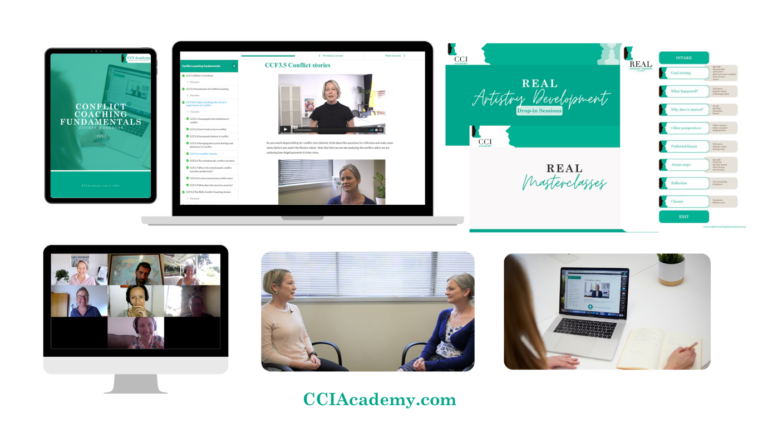Conflict coaching (also called conflict management coaching) is:
A one-on-one process involving someone trained as a coach AND trained in conflict dynamics; and a client who wishes to manage conflict more effectively (now or in the future), who are in a specific kind of (coaching) relationship aimed at changing the client’s mindset about conflict (and thus improving the way they manage it) and fostering independence using a process of facilitated reflection on the client’s own conflict experiences.
Let’s examine each of these elements in turn.
One-on-one process

Conflict coaching is an intervention that involves one coach and one client. This is different from mediation, for example, where the mediator has two or more clients. However, conflict coaching is not just “mediation-for-one”, in that the relationship between the coach and the client is significantly different from that between mediator and clients (more on this below), and coaching is also significantly different (in relation to both aims and process) from mediation (including what might happen in one-on-one interactions between a mediator and one of their clients, e.g. in pre-mediation meetings or in private sessions).
Practitioner trained as a coach and in conflict dynamics

Effective conflict management coaching requires the coach to be trained in BOTH coaching and conflict dynamics. This is because coaching is a different role to other conflict-related roles such as mediator, arbitrator or adviser, and a coach has specific ethical obligations arising from the coaching relationship. Conflict management coaches need to understand how coaching differs from other processes (such as providing advice, education, mentoring, or therapy). Being a professional coach requires a nuanced understanding of the coaching role and relationship, and the particular ethical obligations and challenges involved.
Client wishes to manage conflict more effectively

Conflict coaching aims to support the client to manage conflict more effectively, now or in the future. This may, in some cases, lead to the client’s conflict being resolved, but resolution does necessarily involve other people, who are not involved in the coaching. Some conflict is also not resolvable, and effective management is the best outcome possible. Conflict coaching can address a client’s current conflict, but it is also capacity building, and so will typically have a positive impact on how the client manages future conflict.
Specific kind of relationship

The distinction between coaching and other relationships is important. As Smith and Arnold explain in The Ethical Coaches Handbook: “Coaching is part of the human experience. Yet, a professional coach is different … This role – coaching – lives outside the realm of sport, mentoring, consulting, therapy, management, training, or instruction.” The coaching relationship can be thought of as similar to what, in therapeutic terms, is known as a “working alliance” or a collaborative partnership. This terminology acknowledges that like it or not, the coach is involved and will influence what happens. Coaches are not a mere facilitator of a process or a blank screen upon which the client may work to achieve their goals. A coaching relationship is also very different from that between a mediator and client. A coach is the client’s ally, unapologetically on the client’s side, whereas a mediator must be impartial.
Change the client’s mindset

Conflict coaching aims to supporting a person to shift their conflict mindset about conflict (whether it’s a specific and current conflict, or about conflict in general). A client’s conflict mindset is a set of beliefs that shape how they make sense of conflict and their role in it, and influences how they think, feel and behave. Coaching aims to develop a client’s mindset so that they:
- embrace complexity and uncertainty
- develop curiosity (especially of other people’s perspectives), flexibility and openness to change, and a willingness to be vulnerable
- become active and independent, with the ability to identify and make informed choices
- develop the ability to learn from the past but remain future focused.
Foster independence

Coaches work from the premise that clients are naturally creative and resourceful, and capable of making their own choices about how they want to manage their conflict. Accordingly, conflict coaching fosters independence in the client. It is not intended to be directive or a long-term intervention. When successful, it is a capacity building activity, which supports the client to develop competence and confidence to independently manage conflict in the future.
Facilitated reflection

Coaching is effectively a process of facilitated reflection. The coach does not teach the client about relevant conflict theories or skills. Rather, the coach supports the client to think deeply about their own conflict experiences, to draw out useful learning from that reflection, and to use that learning to inform their future choices and actions.

If you’d like to read more about conflict coaching, my book Conflict Coaching Fundamentals is available from all good booksellers.
You can also become an accredited conflict coach through CCI Academy (course approved by the International Coach Federation):



Pingback: Solid gold tips for staying on the cutting edge of ADR - Conflict Management Academy